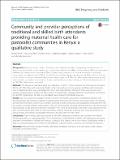| dc.date.accessioned | 2021-08-25T20:40:25Z | |
| dc.date.available | 2021-08-25T20:40:25Z | |
| dc.date.issued | 2016-03-01 | |
| dc.identifier.citation | Byrne, A., Caulfield, T., Onyo, P. et al. Community and provider perceptions of traditional and skilled birth attendants providing maternal health care for pastoralist communities in Kenya: a qualitative study. BMC Pregnancy Childbirth 16, 43 (2016). https://doi.org/10.1186/s12884-016-0828-9 | en_US |
| dc.identifier.uri | http://repository.amref.org/handle/123456789/147 | |
| dc.description | Open Access This article is distributed under the terms of the Creative Commons Attribution 4.0 International License (http://creativecommons.org/licenses/by/4.0/), which permits unrestricted use, distribution, and reproduction in any medium, provided you give appropriate credit to the original author(s) and the source, provide a link to the Creative Commons license, and indicate if changes were made. The Creative Commons Public Domain Dedication waiver (http://creativecommons.org/publicdomain/zero/1.0/) applies to the data made available in this article, unless otherwise stated. | en_US |
| dc.description.abstract | Background
Kenya has a high burden of maternal and newborn mortality. Consequently, the Government of Kenya introduced health system reforms to promote the availability of skilled birth attendants (SBAs) and proscribed deliveries by traditional birth attendants (TBAs). Despite these changes, only 10 % of women from pastoralist communities are delivered by an SBA in a health facility, and the majority are delivered by TBAs at home. The aim of this study is to better understand the practices and perceptions of TBAs and SBAs serving the remotely located, semi-nomadic, pastoralist communities of Laikipia and Samburu counties in Kenya, to inform the development of an SBA/TBA collaborative care model.
Methods
This descriptive qualitative study was undertaken in 2013–14. We conducted four focus group discussions (FGDs) with TBAs, three with community health workers, ten with community women, and three with community men. In-depth interviews were conducted with seven SBAs and eight key informants. Topic areas covered were: practices and perceptions of SBAs and TBAs; rewards and challenges; managing obstetric complications; and options for SBA/TBA collaboration. All data were translated, transcribed and thematically analysed.
Results
TBAs are valued and accessible members of their communities who adhere to traditional practices and provide practical and emotional support to women during pregnancy, delivery and post-partum. Some TBA practices are potentially harmful to women e.g., restricting food intake during pregnancy, and participants recognised that TBAs are unable to manage obstetric complications. SBAs are acknowledged as having valuable technical skills and resources that contribute to safe and clean deliveries, especially in the event of complications, but there is also a perception that SBAs mistreat women. Both TBAs and SBAs identified a range of challenges related to their work, and instances of mutual respect and informal collaborations between SBAs and TBAs were described.
Conclusions
These findings clearly indicate that an SBA/TBA collaborative model of care consistent with Kenyan Government policy is a viable proposition. The transition from traditional birth to skilled birth attendance among the pastoralist communities of Laikipia and Samburu is going to be a gradual one, and an interim collaborative model is likely to increase the proportion of SBA assisted deliveries, improve obstetric outcomes, and facilitate the transition. | en_US |
| dc.description.sponsorship | Australian government’s Department of Foreign Affairs and Trade | en_US |
| dc.language.iso | en | en_US |
| dc.publisher | BioMed Central | en_US |
| dc.subject | Maternal health | en_US |
| dc.subject | Newborn health | en_US |
| dc.subject | Skilled birth attendants | en_US |
| dc.subject | Traditional birth attendants | en_US |
| dc.subject | Health systems | en_US |
| dc.subject | Pastoralist communities | en_US |
| dc.subject | Kenya | en_US |
| dc.title | Community and Provider Perceptions of Traditional and Skilled Birth Attendants Providing Maternal Health Care for Pastoralist Communities in Kenya: A Qualitative Study | en_US |

